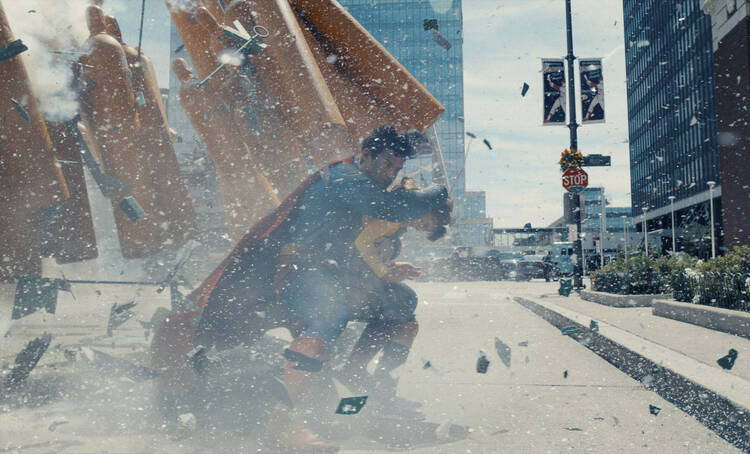The last time Superman was adapted for the big screen, he was presented as both god and man. Beginning with 2013’s “Man of Steel,” the writer and director Zack Snyder pondered the tensions of that duality, as embodied by Henry Cavill. How does he bear the responsibility and the expectations (savior, destroyer) that others map onto him? How does he balance his titanic powers with a human heart? Snyder used Christ imagery in depicting Superman and often shot him in awe-inspiring low angles: a divine being descending from the heavens.
The first time we see the titular hero of James Gunn’s new film “Superman,” he doesn’t descend from the heavens. He plummets.
Falling to earth after (the opening titles tell us) the first fight he’s ever lost, Superman (David Corenswet) smashes into a snowy field like a meteor. We get our first proper look at him lying facedown in the snow, bleeding from his mouth, drawing breath in undignified wheezes. The fact that he survived the crash at all tells us that he’s a man of steel. But the very familiar way he winces whenever he tries to move assures us he’s a man of flesh and blood as well.
That is the heart of this newest take on the prototypical superhero: The “man” counts as much (if not more) than the “super.” This is a Superman who frequently makes mistakes, gets frustrated, fails to achieve his goals. The hackneyed criticism that Superman is boring because he’s too powerful has never felt more false: The fact that he has those powers and still struggles to do the right thing, like the rest of us, is exactly what makes him compelling.
Gunn’s reboot arrives on a wave of hype and hope. In 2022, DC Studios announced that Gunn and Peter Safran would take the reins of their comic book film franchise, course-correcting from the studio’s first attempt to replicate Marvel’s success at a comic book cinematic universe. Those original DC films—running from DC’s “Man of Steel” (2013) through “Aquaman and the Lost Kingdom” (2023)—started out as dour and portentous and eventually became hollow and anonymous. With a few exceptions, the franchise has now restarted from scratch, creating a clean slate on which Gunn and Safran hope to draft something new and more profitable.
“Superman” is our first glimpse into this new world, as much a statement of intent as a standalone film. While I’ll admit to being a Gunn skeptic (I think he is an undeniably good filmmaker whose storytelling style and humor I often find grating), there is a lot to be excited about here.
The previous films’ aesthetic was gritty and desaturated; “Superman” is an explosion of color and light and optimism. Gunn was hired for his distinctive directorial flair—which worked so well on Marvel’s “Guardians of the Galaxy” franchise—and it’s on full display here. He shoots much of the film with wide-angle lenses, giving scope and propulsion to the action, especially the flying scenes. He introduces us to funny and dynamic versions of familiar characters played by a fantastic cast, notably Rachel Brosnahan as Lois Lane, Skyler Gisondo as Jimmy Olsen and Nicholas Hoult as Lex Luthor. He also wisely starts the story in medias res, introducing us to a universe already in motion and neatly avoiding the deadweight of showing us the same familiar origin story beats.
That all sounds pretty great, right? And it is… when it’s a Superman movie. Unfortunately, “Superman” is also the launching point for a new cinematic universe, which means that it is crammed with additional characters, worldbuilding and table-setting for the next decade’s worth of films. A decent amount of screen time is ceded to a team of corporate superhumans who will, presumably, form the backbone of a future Justice League film. There is also a superpowered dog, a pair of superpowered heavies working for Luthor, an element-manipulating metahuman with a green mutant baby and subplots involving an extra-dimensional prison, a brewing war in Eastern Europe and the effects of cancel culture. Did I mention the superpowered dog?
Consequently, “Superman” often feels too busy for its own good. The individual elements are all fun enough in their own right, but they distract from the heart of the story: Superman himself.
That’s a shame, since Corenswet is the film’s greatest asset. Taking on a role so loaded with history and expectation is a superhuman feat itself, but Corenswet proves up to the challenge. He imbues the role with strength and vulnerability in equal measure, radiating the sort of innate goodness that made Christopher Reeve’s take on the character so iconic (Reeve, to be clear, remains the best to ever do it). Gunn deserves credit for crafting this character and the world around him, but the character comes to life because of Corenswet. As much as I hope Corenswet doesn’t get trapped in franchise purgatory, I am looking forward to seeing his Superman again.
“Superman” is strongest when the film focuses on the title character and his struggle to do good. That’s what makes these stories compelling: not Superman’s powers but what he does with them. During a particularly dark moment in the film, Superman insists, “There’s always a way.” That’s a line from All-Star Superman, a comic mini-series by Grant Morrison and Frank Quitely that served as one of Gunn’s inspirations. It’s a better motto for the character than “Truth, Justice, and the American Way.” The Superman of this film fails again and again. He’s rejected, vilified, hurt and imprisoned. Often the very things he does to save the day end up making things worse.
But he never gives up. He fails, and tries again, and again and again, until he finds a way. That is where Superman’s humanity is most present: the reality of hardship and the refusal to stop hoping, loving and working for a better world in spite of it. The best Superman stories show us that we can do that, too.








